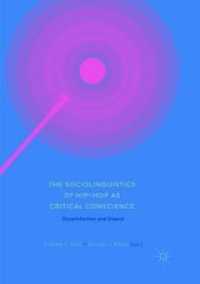基本説明
Explores the range of services designed to facilitate academic writing and publication in English by non-native English-speaking (NNES) authors. It analyses the realities of services including education, translation, editing and writing, and then considers the challenges and benefits that result when these boundaries are consciously blurred. Features - provides insights into the approaches used by experienced practitioners across Europe; higlights the work of Anglophone language professionals working in non-Anglophone settings; emphasises professional and ethical responsibilities.
Full Description
Supporting Research Writing explores the range of services designed to facilitate academic writing and publication in English by non-native English-speaking (NNES) authors. It analyses the realities of offering services such as education, translation, editing and writing, and then considers the challenges and benefits that result when these boundaries are consciously blurred. It thus provides an opportunity for readers to reflect on their professional roles and the services that will best serve their clients' needs. A recurring theme is, therefore, the interaction between language professional and client-author. The book offers insights into the opportunities and challenges presented by considering ourselves first and foremost as writing support professionals, differing in our primary approach (through teaching, translating, editing, writing, or a combination of those) but with a common goal. This view has major consequences for the training of professionals who support English-language publication by NNES academics and scientists. Supporting Research Writing will therefore be a stimulus to professional development for those who support English-language publication in real-life contexts and an important resource for those entering the profession.
Contents
List of figures and tables
First foreword
Second foreword
Third foreword
Editor's preface
Valerie Matarese
About the contributors
Chapter 1: The contribution of language professionals to academic publication: multiple roles to achieve common goals
Abstract:
Introduction
Managing expectations
Establishing credibility as a language professional
Issues of authority and control
Putting it all together: the multifaceted nature of the language professional's role
Learning points
Part 1: Teaching NNES authors to write in English
Chapter 2: Teaching academic writing in Europe: multilingual and multicultural contexts
Abstract:
Introduction
Teaching academic writing in European universities: origins, approaches and clientèle
Teaching academic writing: key perspectives and approaches
Who teaches academic writing and who should teach it?
Conclusions
Learning points
Chapter 3: Writing process research: implications for manuscript support for academic authors
Abstract:
Introduction
Real-world writing
Recursive writing
Revision and dissonance
Further considerations for non-anglophone settings
Generalizability and conclusions
Learning points
Chapter 4: Using genre analysis and corpus linguistics to teach research article writing
Abstract:
Introduction
Using genre analysis in a publications skills course: an overview
Relationships of structure to what editors and referees look for
Analysis of moves or stages: using insights from linguistics research to model Introduction structure
Introducing authors to corpus linguistics
Using this approach in one-to-one contexts
Learning points
Chapter 5: Using strategic, critical reading of research papers to teach scientific writing: the reading--research--writing continuum
Abstract:
Reading in the research setting
A writing course based on reading
A stand-alone reading module
The reading-research-writing continuum
Learning points
Part 2: Helping NNES authors publish through translation
Chapter 6: The translator as cultural mediator in research publication
Abstract:
Introduction
The dynamics of intercultural transactions
Conclusion
Learning points
Chapter 7: Giving authors a voice in another language through translation
Abstract:
Introduction
Knowledge creation, epistemology and voice
Translating voice
Conclusions and recommendations
Learning points
Chapter 8: Bilingual publication of academic journals: motivations and practicalities
Abstract:
Introduction
A small but steady trend towards bilingual publishing?
Why publish a bilingual journal?
The practicalities of bilingual publication
Final considerations
Learning points
Part 3: Facilitating publication through editing and writing support
Chapter 9: Defining and describing editing
Abstract:
A difficult term to define
Editing, publishing and redacting: an excursion into etymology
Types of editing
Defining and describing the editing assignment
A hybrid between editing and translation
A glossary of editing terminology (excluding journalism)
Learning points
Chapter 10: Journal copy-editing in a non-anglophone environment
Abstract:
Introduction
Defining NNES journals
Copy editors working for NNES journals
Challenges of copy-editing in NNES journals
The educating role of copy editors
An effective strategy for NNES journals
Conclusions
Learning points
Chapter 11: The authors' editor: working with authors to make drafts fit for purpose
Abstract
Introduction
Author editing
The levels of author editing
Working with NNES authors
Practicalities of author editing
Establishing a long-term relationship with authors
Recognition of the AE's work
Conclusions
Learning points
Chapter 12: The writer's approach to facilitating research communication: a very different way of engaging with authors
Abstract
Introduction
The relationship between writing and authorship
Facilitating written communication—the writer's approach
Ethical issues
Applicability to other approaches
Learning points
Part 4: Blurring the boundaries
Chapter 13: Didactic editing: bringing novice writers into the arena of scholarly publishing
Abstract
Introduction
Learning simply by reading edited texts
The advantages of editing proactively
Skills useful to novice and more experienced authors
Formal opportunities for teaching through editing
The benefits to authors' editors
Learning points
Chapter 14: Collaborative research writing: developmental editing with an underlying educational vein
Abstract
The research paper in crisis, developmental editing to the rescue
Team research writing
Helping novice authors get started
Handling the manuscript not ready for editing
When collaborative writing may not work or is not appropriate
Conclusions
Learning points
Chapter 15: Putting 'wordface' work at the centre of academic text production: working with an international journal to develop an authors' mentoring programme
Abstract:
Introduction
Anglophone centre journals
Why and how the mentoring programme came about: three points of contact
The journal editor: concerns
The researcher: findings
The writing teacher-translator: insights
A shared perspective on the importance of 'wordface' work
The programme
Wordface work: facing in two directions
Funding
Outcomes of the programme
Conclusion
Learning points
Afterword: Supporting research writing in non-anglophone Europe: reflections and recurring themes
Abstract:
Introduction
The profession of writing support provision
Recurring themes in supporting research writing
Conclusions
Learning points
Index






